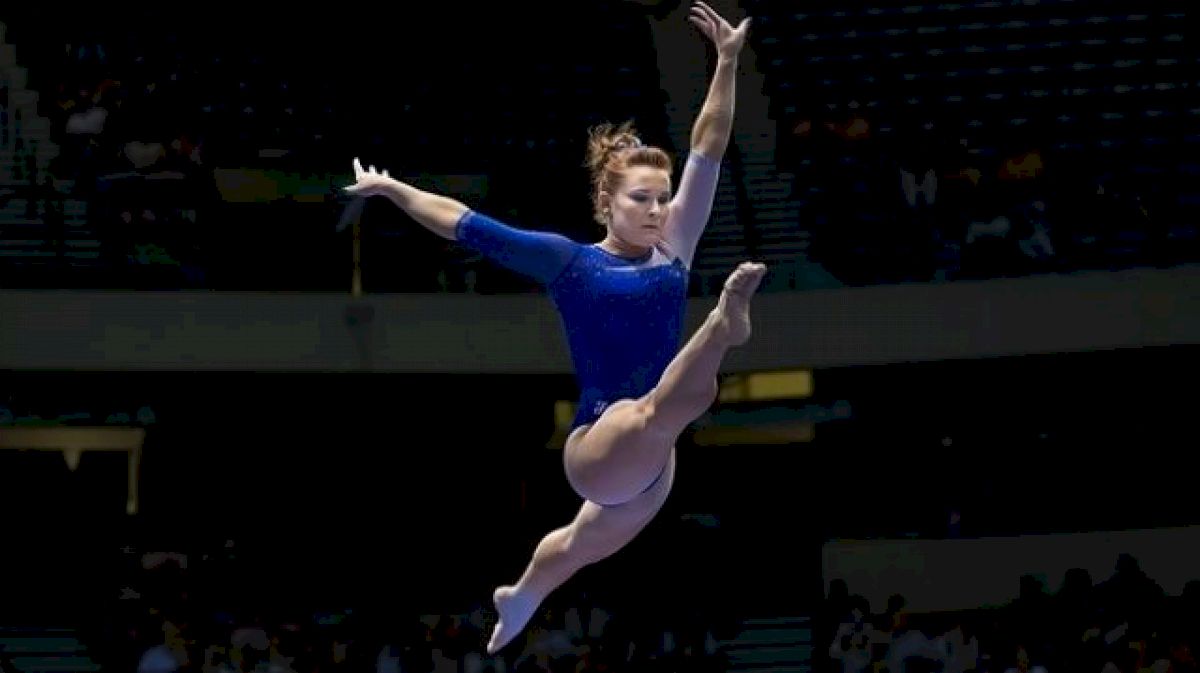2014 NCAA Womens Gymnastics ChampionshipsApr 25, 2014 by Anne Phillips
Hot Topic Debate: Should we Change the Scoring Format in NCAA Women's Gymnastics?
Hot Topic Debate: Should we Change the Scoring Format in NCAA Women's Gymnastics?
Hot Topic Debate: Should we Change the Scoring Format in NCAA Women's Gymnastics?


In a pre-NCAA Championships interview, Miss Val of UCLA turned the tables and posed an interesting question to the fans of Gymnastike: Should we change the rules and move to a 5-up, 5-count or 6-up, 6-count format in women's NCAA Gymnastics? Great question, Val!
This topic has been debated back and forth throughout the years. Currently, women's NCAA gymnastics uses a 6-up, 5-count scoring system, meaning that six gymnasts from each team are allowed to compete on each of the four events. Then, the lowest individual score on each event will be dropped from the final team score. In the end, and the top five scores on each event count towards the team total. In the suggested format change, all scores would count.
NCAA women's gymnastics is actually one of the few levels of gymnastics to drop scores at Championships. Men's NCAA gymnastics has moved to an "all scores count" scoring system for the last half of their season, utilizing 5-up, 5-count for their Championships. At the elite level, all scores count in the World and Olympic Team finals with a 3-up, 3-count format.
Let's look at the numbers. If a 6-up, 6-count format were in place for the 2014 Super Six, the meet would not have ended in a tie. The University of Florida would have edged out Oklahoma by half a tenth, 237.625 over 237.575. Other than that, the final rankings remained the same. Check out the evidence below.
How the 2014 Super Six Results would have looked with ALL 6 Scores counting:
1. Florida, 237.625 (originally tied for 1st)
2. Oklahoma, 237.575 (originally tied for 1st)
3. LSU, 236.825 (originally 3rd)
4. Alabama, 236.375 (originally 4th)
5. Georgia, 235.175 (originally 5th)
6. Nebraska, 234.70 (originally 6th)
We also did the math for session two on the prelim day. In the actual meet results, only one tenth of a point separated third through fifth place in this incredibly competitive session. With the proposed new rules, the teams saw more separation in the final rankings. UCLA jumped Utah for 4th place, but the three qualifying teams remained the same. Alabama dropped behind Nebraska and survived Super Six qualification by just one tenth.
Semifinal 2 results with ALL 6 scores counting:
1. Florida, 236.35 (originally tied for 1st)
2. Nebraska 236.125 (originally 3rd)
3. Alabama, 236.100 (originally tied for 1st)
4. UCLA, 236.000 (originally 5th)
5. Utah, 235.325 (originally 4th)
6. Penn State 232.725 (originally 6th)


However, what can't be calculated in the above scenarios is the increased level of pressure put on the athletes. Knowing that every routine, every skill, every single toe point and landing counts for your team could potentially cause mentally weak athletes to falter. Also, what happens when an injury occurs and an athlete is unable to finish their routine? These are all factors to consider when picking a side.
And finally, as Val points out, this rule change might encourage teams to compete simpler, safer, and ultimately more boring routines. When considering the new scenario, she told us, "I love the fact that everything counts. My concern is watering down routines. I would hate not to encourage creativity and stuff like Danusia's dismount on beam."
And finally, as Val points out, this rule change might encourage teams to compete simpler, safer, and ultimately more boring routines. When considering the new scenario, she told us, "I love the fact that everything counts. My concern is watering down routines. I would hate not to encourage creativity and stuff like Danusia's dismount on beam."
I decided to get the conversation going right from the source who will ultimately be responsible for the rule change, the women's NCAA coaches. After their NCAA preliminary session, K.J. Kindler of Oklahoma, D-D Breaux of LSU, and Danna Durante of Georgia weighed in on the debate. Their responses could not have been more different, and it makes for an incredibly entertaining video! Check it out:
Now, let's hear your take. Would you like to see NCAA women's gymnastics move to scoring format where ALL routines count? Pick a side in the poll below.
What are some of the other rule changes we would implement to differentiate the top teams in NCAA women's gymnastics?
If you can't get enough of NCAA gymnastics, watch the moving full length documentary of the 2014 NCAA Championships now in Gymnastike Gold!
If you can't get enough of NCAA gymnastics, watch the moving full length documentary of the 2014 NCAA Championships now in Gymnastike Gold!
Related Content
 Replay: Lander vs Mars Hill | Mar 28 @ 6 PM
Replay: Lander vs Mars Hill | Mar 28 @ 6 PMMar 29, 2024
 Replay: Coker vs Wingate | Mar 21 @ 6 PM
Replay: Coker vs Wingate | Mar 21 @ 6 PMMar 22, 2024
 Replay: Wingate Tri-Meet - Acrobatics & Tumbling | Mar 15 @ 5 PM
Replay: Wingate Tri-Meet - Acrobatics & Tumbling | Mar 15 @ 5 PMMar 15, 2024
 Replay: Mars Hill Tri-Meet | Feb 16 @ 6 PM
Replay: Mars Hill Tri-Meet | Feb 16 @ 6 PMFeb 17, 2024
 Replay: King (TN) vs Wingate - 2024 2024 King (TN) vs Wingate - Acrobatics & Tumbling | Feb 10 @ 4 PM
Replay: King (TN) vs Wingate - 2024 2024 King (TN) vs Wingate - Acrobatics & Tumbling | Feb 10 @ 4 PMFeb 10, 2024
 Replay: Belmont Abbey vs Mars Hill | Feb 10 @ 3 PM
Replay: Belmont Abbey vs Mars Hill | Feb 10 @ 3 PMFeb 10, 2024
 Replay: King vs Mars Hill | Apr 6 @ 6 PM
Replay: King vs Mars Hill | Apr 6 @ 6 PMApr 7, 2023
 Replay: Lander vs Coker | Apr 5 @ 6 PM
Replay: Lander vs Coker | Apr 5 @ 6 PMApr 6, 2023
 Replay: Belmont Abbey vs Limestone | Apr 5 @ 6 PM
Replay: Belmont Abbey vs Limestone | Apr 5 @ 6 PMApr 6, 2023